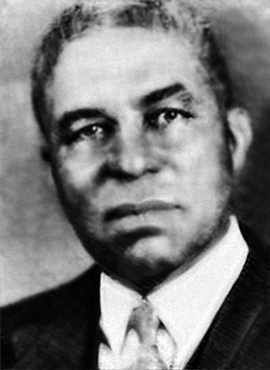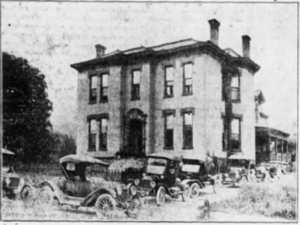John Henry Hale facts for kids
Quick facts for kids
John Henry Hale
|
|
|---|---|
 |
|
| Born | June 5, 1878 |
| Died | March 27, 1944 (aged 65) Hubbard Hospital, Nashville, Tennessee, US
|
| Burial place | Greenwood Cemetery, Nashville, Tennessee |
| Alma mater | Central Tennessee College, Meharry Medical College |
| Occupation | surgeon; professor |
| Years active | 1905–1944 |
| Employer | Millie E. Hale Hospital, Meharry Medical College |
| Spouse(s) | Millie E. Hale; Carrie (Jordan) Hale |
| Awards | Distinguished Service Medal, 1944 |
John Henry Hale (June 5, 1878 – March 27, 1944) was a very important surgeon, professor, and kind person. He helped build the black medical community in the United States. People called him the "dean of American Negro surgeons." Dr. Hale performed over 30,000 surgeries. Most of these were done at Meharry Medical College and Millie E. Hale Hospital. He worked and taught at Meharry for 29 years. During this time, he guided many black surgeons.
John Henry Hale and his wife, Millie, did a lot of good deeds in their black community in Nashville, Tennessee. They gave food to people who needed it. They also offered free medical care and held free medical classes. They even turned their home into a community center. This center hosted many local community groups.
Hale was the president of the National Medical Association in 1935. He received a special award called the Distinguished Service Medal. Medical groups, a medical center in California, and a housing project in Nashville were named after him.
Contents
Early Life and Education
John Henry Hale was born on June 5, 1878, in Estill Springs, Tennessee. His parents were Aaron and Emma Hale. He went to elementary school in Estill Springs. Then, in the 1890s, he moved to Nashville.
In 1901, Hale graduated from Walden University in Nashville. He earned a Bachelor of Science (B.S.) degree. For the next four years, he studied at Meharry Medical College. He became a Doctor of Medicine (M.D.) in 1905. While at Meharry, Hale learned a lot from Daniel Hale Williams' surgical clinics. This inspired him to become a surgeon. Soon after graduating, on December 20, 1905, Hale married his first wife, Millie Essie (Gibson) Hale.
Medical Career
After finishing medical school, Dr. Hale was asked to join Meharry Medical College full-time. He became a teacher and a doctor at the hospital connected to the college. This hospital was first called Mercy Hospital. It was started in 1900 by Robert F. Boyd and had 27 beds. In 1910, it was renamed Hubbard Hospital and moved to a new location.
Hale began teaching histology (the study of body tissues) from 1905 to 1911. He was very interested in surgery, thanks to Daniel Hale Williams. Since advanced surgery training wasn't available at Meharry, Hale traveled. He visited famous places like Mayo Clinic in Minnesota and Crile Clinic in Ohio. He also went to the University of Chicago to learn more about surgery.
Hale started doing surgeries as early as 1906. He often helped patients in Nashville who couldn't pay. He led the tumor clinic at Mercy Hospital for a short time. He then became a clinical instructor. Hale became a skilled surgeon who could handle most types of operations. This was common for doctors back then.
In 1922, Hale became the director of surgery at Meharry. The next year, he became the chief of staff for surgery at Hubbard Hospital. In 1924, he became a clinical professor of surgery at Meharry. He became a full professor in 1931. By 1938, he was the chairman of the Department of Surgery at Hubbard Hospital. Dr. Hale performed about 30,000 surgeries before he passed away in 1944. He was given the Public Health Service Distinguished Service Medal after his death. This award was for his "amazing contribution to the Negro medical profession."
Millie E. Hale Hospital
In 1916, John Henry Hale and his wife, Millie, started a new hospital. This happened after their baby son, John Henry Hale Jr., passed away. The hospital was built to treat the black community of Nashville, which had about 35,000 people. The hospital was named after Millie, who was the main leader and manager. Dr. Hale was the chief surgeon.
The hospital opened with 12 beds in 1916. By 1922, it had grown to 75 beds. The hospital met all the high standards set by the state of Tennessee. By 1923, over 5,000 surgeries had been done there, mostly by Dr. Hale.
After his wife Millie passed away in 1930, Dr. Hale kept the Millie E. Hale Hospital running for eight more years. But in 1938, the leaders at Meharry Medical College felt Dr. Hale was doing too much. So, the hospital closed. Its staff and patients then moved to Hubbard Hospital.
Other Medical Work
Dr. Hale followed the example of his teacher, Daniel Hale Williams. He held many teaching clinics across the American South. He wanted to share his surgical knowledge with other black doctors.
Hale also supported the Tuskegee Institute, a historically black university in Alabama. He was the president of the National Medical Association in 1935. He was also very active in the Meharry Alumni Association.
Helping the Community
John Henry Hale was a very religious Christian. He spent most of his time and money helping the black community in Nashville. He gave over 100 free talks and clinics. He and his wife did not charge patients who couldn't pay at Millie E. Hale Hospital. They performed medical procedures for free and even paid for medicines themselves.
The Hale family slowly turned their home into a community center. It became a meeting place for many groups working to improve people's lives. The Hales also gave out free food and provided home care to the poorest people in their community.
Personal Life and Passing
Friends described John Henry Hale as a "colorful personality." He was a big man, and people often called him "Big John." His friends and colleagues also said he was calm and religious.
Hale married his first wife, Millie E. (Gibson) Hale, on December 20, 1905. They had three children: John Henry Jr., Essie Margaret, and Mildred (Hale) Freeman. Mildred followed her mother's path and graduated from Fisk University. She was active in the black community. She worked as a nurse and a school teacher. Mildred married Samuel Henry Freeman, who was Hale's student. Samuel later became the first black doctor to get a master's degree in Orthopedics (bone and joint surgery).
After his first wife passed away in 1930, Hale married Carrie (Jordan) Hale. The couple then lived at a different address. This was because Hale's first home remained a community center.
In his later years, Hale had heart problems. But he kept doing surgeries, even when he felt very sick. He passed away on March 27, 1944, from heart failure at Hubbard Hospital. He was buried at Greenwood Cemetery in Nashville.
Lasting Impact
John Henry Hale is remembered for his huge contributions to African-American medicine. He taught many young doctors who "loved and admired" him. He became "famous" and "internationally known" for his medical work. Dr. Edward L. Turner, who was the president of Meharry Medical College in 1944, believed that Hale "had more influence than any other man in helping and developing black surgeons."
One of Hale's students, Matthew Walker Sr., who took over Hale's job at Meharry, remembered him as "a brilliant teacher." Two other students said he was a professor who "captivated the student body."
His colleagues at Meharry called Hale the "dean of American Negro surgeons." A mural (a large painting on a wall) and a portrait of Hale were put up at Meharry Medical College in 1951. In 2018, Hale was added to the Tennessee Healthcare Hall of Fame.
A public housing project in Nashville with 500 homes was named after Hale. As of 2013, it was a great example of a successful housing project that mixed different income levels.
The California branch of the National Medical Association was named the John Hale Medical Society. In 1969, a medical center in Fresno, California, was named the John Henry Hale Medical Center.
See also
- Millie E. Hale Hospital
- African Americans in Tennessee
- Robert F. Boyd
 | Precious Adams |
 | Lauren Anderson |
 | Janet Collins |


